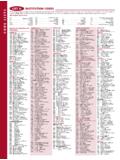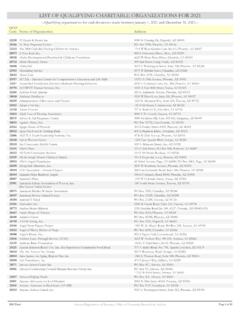Transcription of Dead Aid: Why aid is not working and how there is another ...
1 DAMBISA MOYODead AidWhy Aid Makes Things Worse and How there is another Way for Africa PENGUIN BOOKSC ontents Foreword by Niall Ferguson Preface Introduction PART I The World of Aid 1 The Myth of Aid 2 A Brief History of Aid 3 Aid is Not working 4 The Silent Killer of Growth PART II A World without Aid The Republic of Dongo 5 A Radical Rethink of the Dependency Model 6 A Capital Solution 7 The Chinese are Our Friends7 The Chinese are Our Friends 8 Let s Trade 9 Banking on the Unbankable Dongo Revisited 10 Making Development Happen Notes Bibliography Acknowledgements PENGUIN BOOKSDEAD AID Dambisa Moyo worked at Goldman Sachs for eight years, having previouslyworked for the World Bank as a consultant. Dambisa completed a PhD inEconomics at Oxford University, and holds a Masters from Harvard UniversityKennedy School of Government. She was born and raised in Lusaka, Peter BauerTo the Excellencies and officials of Europe: We suffer enormously in Africa.
2 Helpus. We have problems in Africa. We lack rights as children. We have war andillness, we lack food .. We want to study, and we ask you to help us to study sowe can be like you, in found on the bodies of Guinean teenagers Yaguine Koita and FodeTounkara, stowaways who died attempting to reach Europe in the landinggear of an by Niall Fergusonby Niall Ferguson It has long seemed to me problematic, and even a little embarrassing, that somuch of the public debate about Africa s economic problems should beconducted by non-African white men. From the economists (Paul Collier, WilliamEasterly, Jeffrey Sachs) to the rock stars (Bono, Bob Geldof), the Africandiscussion has been colonized as surely as the African continent was a centuryago. The simple fact that Dead Aid is the work of an African black woman is theleast of the reasons why you should read it. But it is a good reason and educated in Zambia, Dambisa Moyo also brings to her subject a rarecombination of academic expertise and real world experience.
3 Her training ineconomics took her from the World Bank to Harvard and on to Oxford, whereshe obtained her doctorate. Since leaving the academy , she has spent eight highlysuccessful years at Goldman Sachs, most recently as Global Economist andStrategist. It is quite a this is quite a book. Though she is not the first writer to criticize Westernaid programmes in Africa, never has the case against aid been made with suchrigour and conviction. Why, asks Moyo, do the majority of sub-Saharancountries flounder in a seemingly never-ending cycle of corruption, disease,poverty, and aid-dependency , despite the fact that their countries have receivedmore than US$300 billion in development assistance since 1970, The answer shegives is that African countries are poor precisely because of all that aid. Despitethe widespread Western belief that the rich should help the poor, and the form ofthis help should be aid , the reality is that aid has helped make the poor poorer,and growth slower.
4 In Moyo s startling words: Aid has been, and continues tobe, an unmitigated political, economic, and humanitarian disaster for most parts ofthe developing world. In short, it is (as Karl Kraus said of Freudianism) thedisease of which it pretends to be the cure .The correlation is certainly suggestive, even if the causation may be the past thirty years, according to Moyo, the most aid-dependent countrieshave exhibited an average annual growth rate of minus per cent. Between1970 and 1998, when aid flows to Africa were at their peak, the poverty rate inAfrica actually rose from 11 per cent to a staggering 66 per Moyo s crucial insight is that the receipt of concessional (non-emergency) loans and grants has much same effect in Africa as the possession ofa valuable natural resource: it s a kind of curse because it encourages corruptionand conflict, while at the same time discouraging free recounts some of the more egregious examples of aid-fuelled the course of his disastrous reign, Zaire s President Mobutu Sese Seko isestimated to have stolen a sum equivalent to the entire external debt of hiscountry: US$5 billion.
5 No sooner had he requested a reduction in interestpayments on the debt than he leased Concorde to fly his daughter to her weddingin the Ivory Coast. According to one estimate, at least US$10 billion nearly halfof Africa s 2003 foreign aid receipts leave the continent every provision of loans and grants on relatively easy terms encourages this kindThe provision of loans and grants on relatively easy terms encourages this kindof thing as surely as the existence of copious oil reserves or diamond mines. Notonly is aid easy to steal, as it is usually provided directly to African governments,but it also makes control over government worth fighting for. And, perhaps mostimportantly, the influx of aid can undermine domestic saving and investment. Shecites the example of the African mosquito net manufacturer who is put out ofbusiness by well-intentioned aid agencies doling out free offers four alternative sources of funding for African economies, none ofwhich has the same deleterious side effects as aid.
6 First, African governmentsshould follow Asian emerging markets in accessing the international bond marketsand taking advantage of the falling yields paid by sovereign borrowers over thepast decade. Second, they should encourage the Chinese policy of large-scaledirect investment in infrastructure. (China invested US$900 million in Africa in2004, compared with just US$20 million in 1975.) Third, they should continue topress for genuine free trade in agricultural products, which means that the US, theEU and Japan must scrap the various subsidies they pay to their farmers, enablingAfrican countries to increase their earnings from primary product exports. Fourth,they should encourage financial intermediation. Specifically, they need to fosterthe spread of microfinance institutions of the sort that have flourished in Asia andLatin America. They should also follow the Peruvian economist Hernando deSoto s advice and grant the inhabitants of shanty towns secure legal title to theirhomes, so that these can be used as collateral.
7 And they should make it cheaperfor emigrants to send remittances back Dead Aid, Dambisa Moyo does not pull her punches. In a perfect world,'she writes, what poor countries at the lowest rungs of economic developmentneed is not a multi-party democracy, but in fact a decisive benevolent dictator topush through the reforms required to get the economy moving. In other words,rushing to elections before economic growth has got underway is a recipe forfailure. But her most radical proposal comes in the form of a question. What if, she asks, one by one, African countries each received a phone call .. tellingthem that in exactly five years the aid taps would be shut off permanently? The phrase shock therapy fell into some disrepute in Eastern Europe in the1990s. Yet that is precisely what Dambisa Moyo wants to give her Africanhomeland. It may seem draconian. Yet it is worth remembering that, as she pointsout, just thirty years ago Malawi, Burundi and Burkina Faso were economicallyahead of China on a per capita income basis.
8 Foreign direct investment andrapidly growing exports, not aid, have been the key to China s economic needs to learn from is strong medicine that is being prescribed. But no one who reads DeadAid will doubt that Dambisa Moyo s primary motivation is to reduce, not toincrease, hardship. This is an African view of Africa s economic problems. Theresult is a book that manages to be, at one and the same time, hard-headed andbighearted. This reader was left wanting a lot more Moyo, and a lot less In July 1970, ninety students graduated from the University of Zambia, in thecountry s capital, Lusaka. Among them were the university s first black graduates(including some ten young women), and my parents were two of them. They wereboth studying for undergraduate degrees my father reading linguistics, and mymother English. They came from different tribes, from different parts of ruralcolonial Africa: my father, the son of a miner in apartheid South Africa; mymother, the daughter of a man who would later train to be a teacher.
9 My motherdid not speak my father s language, and hence they mainly conversed in met and married while still (formerly known as Northern Rhodesia) had been independent fromBritish colonial rule for just six years, and the excitement at the prospect of whatamazing things lay ahead was palpable. Although, upon graduation, my motherhad eleven job offers (at the time companies were very eager to employ blackgraduates), my father wished to continue his studies. He was offered a scholarshipat the University of California at Los Angeles in the USA and, very soonafterwards, my parents packed up my sister and me and decamped to move was all planned. My parents goal was for my father to further hiseducation (later my mother would complete an advanced degree in Britain), andthen return to 1970s were an exciting time to be African. Many of our nations had justachieved independence, and with that came a deep sense of dignity, self-respectand hope for the future.
10 My parents lived, worked, and studied in the USA foreight years and upon my father s graduation, in 1978, they promptly movedback to Zambia, convinced that their future, and the futures of their children, lay intheir homeland. My parents have never lived abroad again remaining steadfastlycommitted to the view that they can help their country, their continent(contributing in their own small ways), to one day become politically andeconomically great. My mother has forged a career in banking starting as thefirst Zambian woman bank manager, and rising to be Chairman of one ofZambia s leading banks. My father has stayed true to academia but has involvedhimself in broadcasting and also run an anti-corruption spent my formative years in Zambia primary, secondary, and tertiaryschool; ending up studying Chemistry at the same university as my parentsseventeen years earlier. But in July 1990 my studies were interrupted by anattempted coup against the then President, Kenneth Kaunda.



